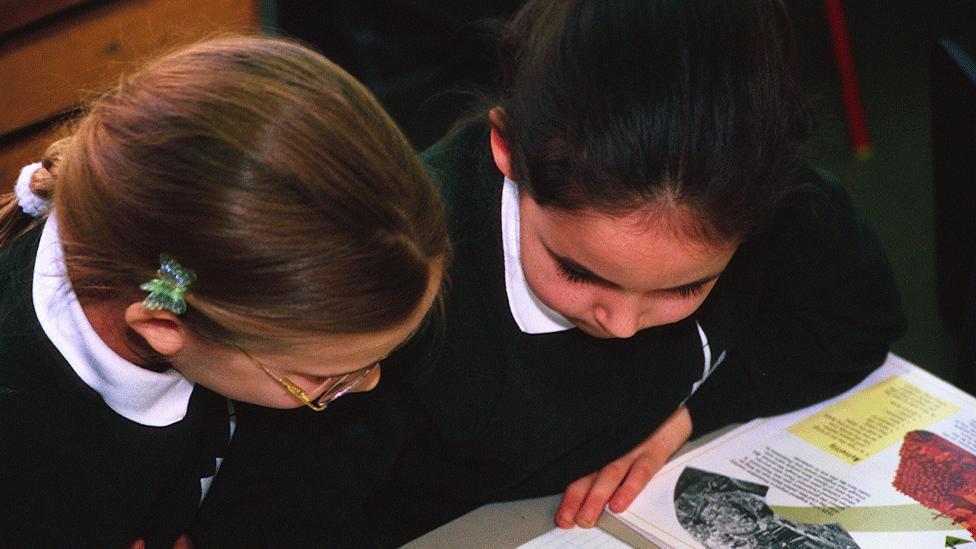Sturgeon the surgeon?
- Published

Emptying bins is one of many services carried out by councils
There could be more change afoot from the Scottish National Party than their rivals are alleging. Sure, they're looking relatively tame in their use of new taxation powers.
But another theme can be found in their manifesto, which - if the polls are any guide - may become a feature of the next few years in Scotland's public life.
Public service reform has already been on the agenda, some of it quite low key, and without always joining up into a clear picture.
On the economy, the enterprise agencies were changed radically in the SNP's first term of office, to focus on support for firms with high growth potential.
Arguably, the biggest two controversies of the second SNP term (after the referendum, that is) were around college amalgamations and police reform, merging eight forces into one.
Much of the political difficulty was driven by accompanying budget cuts, overshadowing parallel reform for fire and rescue.
These measures were attacked by the Liberal Democrats, among others, for "centralisation".
And although that criticism did not appear to change much, it seems to have lodged under the skin of those doing SNP policy thinking. They've got the ear and support of Nicola Sturgeon and, significantly, John Swinney. And they seem up for wielding the scalpel on the way public services are run.
Running schools
As the policy wonks see it, health and schooling are next in line for some significant reconstructive surgery. We've already been told that additional funding for schools should go directly to head teachers, rather than being funnelled through council coffers.
That has long been a Conservative theme. At Westminster, the drive towards standalone "academy" status for each taxpayer-funded secondary - pushed forward in last month's Budget - is going so far that it has become the target of a Tory backbench revolt.
If a similar theme is continued in Scotland, under the SNP, it would represent an unprecedented reversal of the role of local authorities in running Scotland's schools.
And while Tories at Westminster are taking parent governors away from a role in running schools, the SNP says that it wants to give them and local communities a bigger role.

For how much longer could local government have role to play in the running of schools?
So what does the party manifesto spell out? In some ways, it is significant for what's missing.
When it comes to schooling, most of what it says makes no reference to local authorities.
It's almost as if they could lose their role in running schools altogether - or at least, that could be one option if they don't agree both to work more closely together and to transfer power down to more local community level.
"The local community - especially parents and teachers - should be key decision makers in the life of a school," says the manifesto. "We recognise that not all children are the same - and so our education system should not follow a 'one size fits all' model."
You might be forgiven for seeing that as a challenge to the way comprehensive schooling has developed.
Revolution in schooling?
It goes on: "We will ensure strong national standards but also empower local schools.
"We will extend to individual schools responsibilities that currently sit solely with local authorities, allocate more resources directly to headteachers and enable them to take decisions based on local circumstances.
"We will encourage school clusters and create new educational regions to decentralise management and support."
I quote that at length, because it points to quite a revolution in schooling.
And the justification? Because, while Scottish schooling is seen as not having declined, it is slipping down league tables because others are improving faster.

The delivery of health services is a focus for the SNP
On health, the manifesto says: "The number, structure and regulation of health boards - and their relationships with local councils - will be reviewed, with a view to reducing unnecessary backroom duplication."
That process is already under way, through this month's mergers of health and social care provision.
On broader council reform, Nicola Sturgeon, interviewed by my colleague Glenn Campbell and reported on Tuesday evening's BBC news, wasn't ruling much out or in. Nor does the manifesto.
It says the SNP wants to "review the roles and responsibilities of local authorities, and the relationships between local authorities and health boards".
It adds: "We aim to transform our democratic landscape, protect and renew public services and refresh the relationship between citizens, communities and councils."
The party intends to legislate "to decentralise local authority functions, budgets and democratic oversight to local communities".
Do manifestos matter?
That includes more use of citizens' panels and "town hall meetings", while "clusters of agencies and shared interests can work together for the benefit of their local economies and communities".
And on the economy, there's a plan for "regional economic forums, led by the enterprise agencies with strong private sector involvement, to promote and oversee local business support".
That sounds something like the Local Enterprise Companies, until they were abolished and much of their role was handed to councils?
All this is a long distance from nine years ago, when the incoming SNP government signed a "concordat" with councils, external, giving them more autonomy and status than before, with more freedom over their budget. The future of government now looks a lot more crowded and competitive for those at local level.
Do any of the words in a manifesto matter? There are prominent promises from past election plans that were quietly binned, so maybe not.
But having got experience of government, this one looks and feels different. And there's recognition that a manifesto doesn't just list populist promises, but can provide a mandate. Once elected, a government can point to the platform on which it stood as justification for what it wants to do.
The other role for a manifesto is the starting point for political negotiation.
Given that the voting system is designed for Holyrood to have either minority government or coalition, a return to that position would require some consensus between parties on such reforms.
There are elements of these plans that could fit comfortably with Liberal Democrat, Conservative or Scottish Green partners. They all like to talk local and support decentralisation, even though their instinct may be suspicious that the SNP is talking in similar language.
Kezia Dugdale and Labour has left its manifesto late. But Wednesday will give us an idea of whether it too has an appetite for a significant shake-up of Scotland's public services.
Oh, and there's another potential problem. A year from now, Scotland's council candidates will be a week from their date with electoral destiny.
They might be less supportive of this emerging blueprint. And the winners will also be able to claim a mandate.